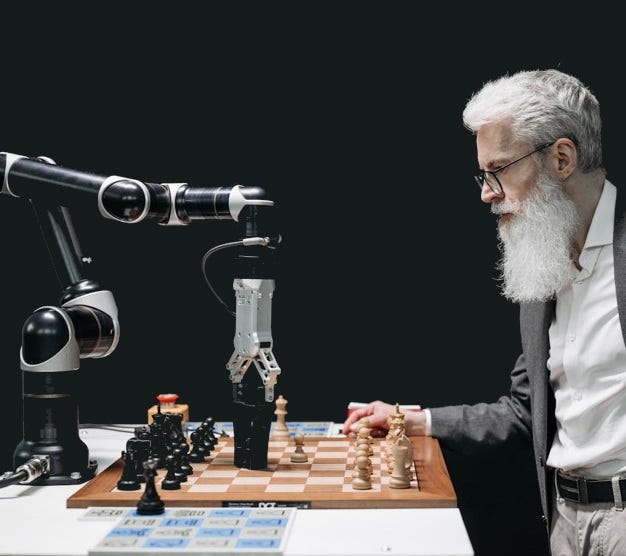“Well, it may have escaped your notice, but life isn’t fair.”
— Severus Snape, from Harry Potter and the Order of the Phoenix, by J. K. Rowling
I previously compared games and life in the piece, What Makes Your Life Great. I’d like to explore what we think makes a game fair, and if we can apply that to our lives. What makes life fair?
Straight Forward Games
Playing a fair game is an expression that can refer to living a balanced life. In the context of an actual game, the expression means recognizing the odds and avoiding preferential outcomes.
Fairness in games clarifies fairness in life. Two aspects of fairness in gaming are transparency and balance.
Transparency is a combination of evidence and honesty. It means the important factors are visible, and what’s hidden is understood. A card game is transparent because each player’s potential is known even though their hand is hidden. What’s unknown is limited and equally unknown by all players.
Transparency is determined by the situation. This is established by the game mechanics. In a board game, this is contained in the rules, environment, and playing pieces. Identifying these in life is not as clear.
Computer and social games also have rules, but understanding them can be part of the game itself. Computer games often have no written rules and instead reveal themselves through graphics and story line. In social games, which are games involving conversation between three or more people, uncertainty is part of the game.
Both computer and social games can dispense with setup and instruction. Their rules, often partly explained or not explained at all, are exposed through game play and players teaching each other.
Balance refers to a parity of resources, skills, and opportunities. The outcome of an unbalanced game has a foregone conclusion, and such a game lacks suspense and surprise.
A lack of balance is often hidden behind unforeseeable or random events making a prejudiced outcome harder to see. The setup of chess doesn’t reveal the skill of your opponent, but you’ll soon find out.
Not So Simple Life
Many of the same expectations and rewards of a fair game apply to life. “That’s not fair!” is the familiar cry when people are denied what they feel they deserve. And while life has no rule book, we insist we deserve a fair shake.
We’re less emphatic about giving fairness to all others, although in public we make things seem reciprocal. But life is complicated and, where obligations are obscure and commitments uncertain, most people feel they deserve whatever they can get.
The game of life seems to have been forever in progress, so we can draw the line at whatever point makes us look most deserving. Funny how people polish their reputations and curate an entitled history.
As a therapist, I hear these autobiographical stories of struggle and entitlement. What’s quite amazing is how little “you people,” who are the authors of your own stories, actually believe them. Our insecurities undermine our public image and give us doubts about the stories we tell ourselves.
As a result, I’ll hear one story—the noble portrait—but sense another. It’s a matter of smell, like your refrigerator where what’s edible is in the front and the leftovers are in the back. It’s when the smell of uncertainty becomes noticeable that people come for counseling.
Where Being Fair Starts
The refrigerator is a good metaphor because it doesn’t take a lot of insight to figure out where the smell is coming from. I start by asking questions which amount to me moving aside what you’ve arranged at the front of your personality. Some people put a jar of sour pickles on the front shelf just to show how honest and deserving they are.
I can see through most melodramas right away. People don’t realize the thinness of their pretenses because they’re not self critical and they don’t socialize with others who would point this out. We certainly won’t tolerate family members calling out our illusions.
No, it’s not a great mystery. People come to me to learn what is fairly obvious. And because they may not want to hear it, I charge a high price as a way of insisting that I be taken seriously.
Fairness is Honesty
A fair game, like a fair situation, is one that reveals itself. Presentation, explanation, and understanding are all aspects of honesty.
Honesty is complicated. It has more to do with what others hear than what you say. It’s said that 95% of our communication is nonverbal, which means it’s some form of body language or intonation.
That’s where most of the truth lies, not so much in what you say. To be honest is to give others proper direction and it is not necessarily, as most of us misunderstand, the truth.
Consider driving a car. You want an honest experience when driving. You want a situation that is clear, fair, and safe. Road signs need to be effective and drivers predictable, which does not mean true, complete, or factual.
Honesty in driving means knowing your place and having the information to place others correctly. Don’t honk if there’s nothing that needs attention, and don’t signal when you’re not going to turn.
I’ve often wondered if we should have a tail light that turns blue when we’re accelerating to complement our red tail light that indicates we’re braking. Would this be a useful sharing of information?
Driving Toward the Future
Now consider how we live our lives. Here there are no traffic rules, turn signals, or speed limits. Fairness is a matter of individual discretion. You decide what information to provide to those around you. You assert what information you deserve, and you’re responsible for other people understanding what you tell them.
The result is so unpredictable that we only establish deep relationships with people who know our quirks and understand more about us than we reveal. We have insubstantial relationships with everyone else. In addition, our lack of consistency limits the duration of our friendships to what’s useful in the short term.
Old friends fade away. I consider this a form of unfairness given how much we invest and rely on each other. The important relationships we shed are like people who walk away from an unfinished game. You are invested, and they were invested. But now they’re not invested, so now they don’t care.
Balance is Most Important
Fairness is how you play, but balance is what you play for.
Book a free, short call and I’ll send you a zoom link.
Listen to this episode with a 7-day free trial
Subscribe to Stream of Subconsciousness to listen to this post and get 7 days of free access to the full post archives.













